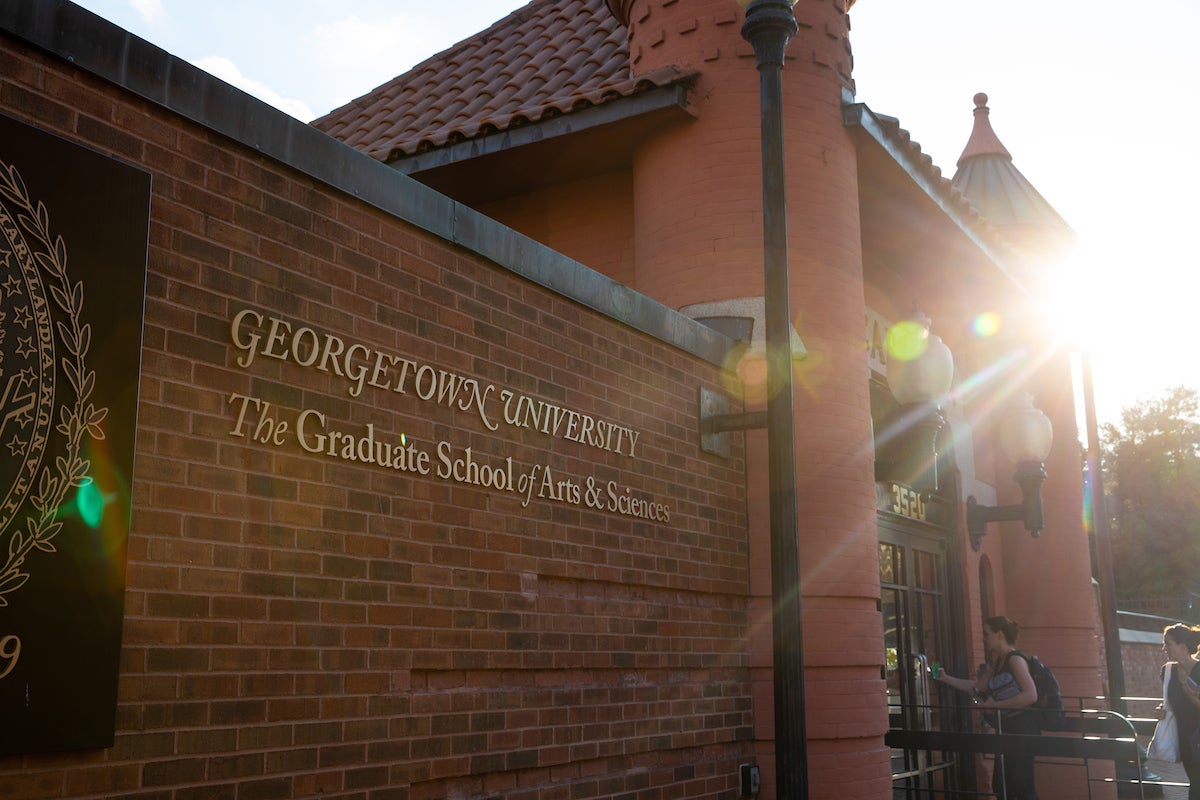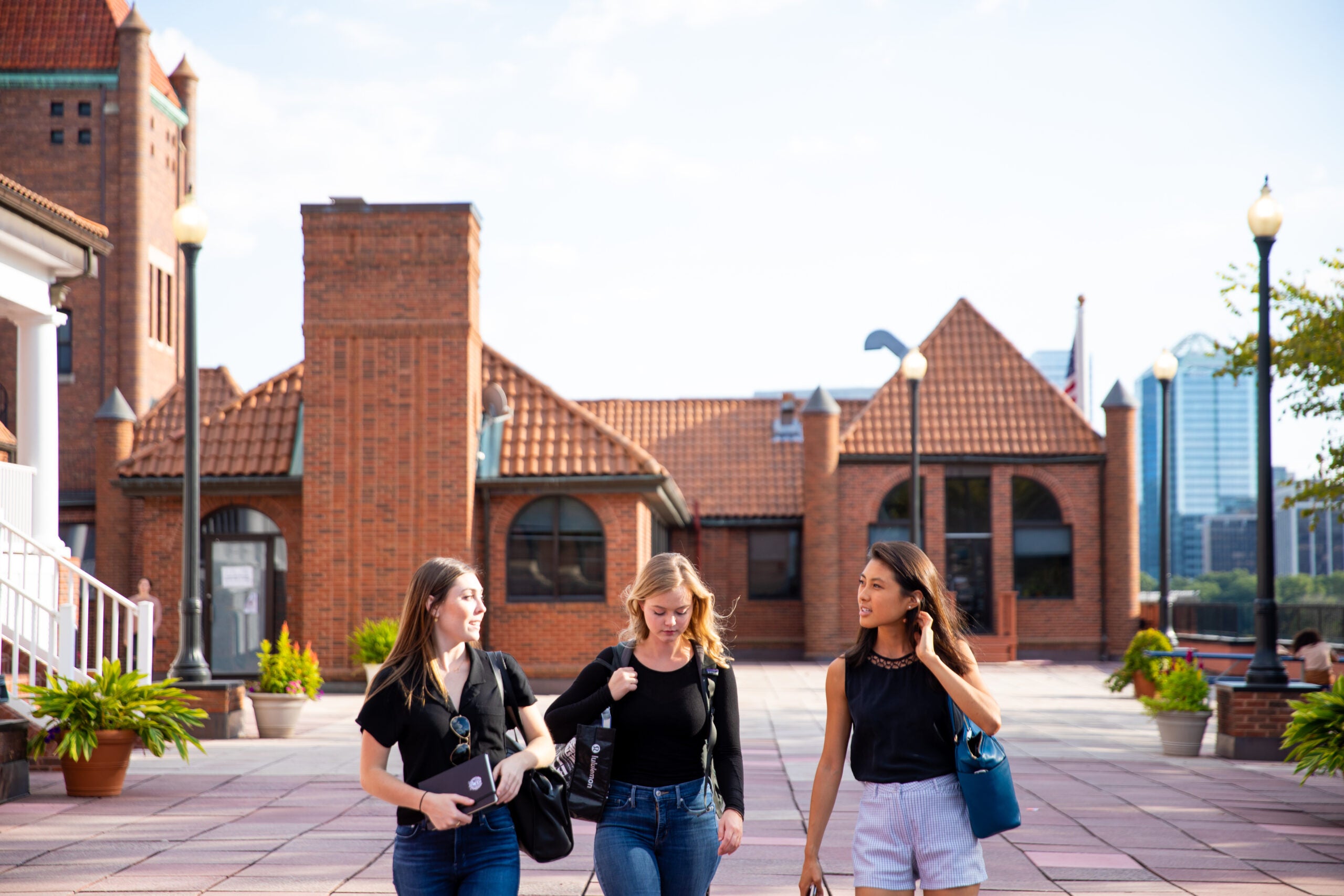Admissions
We are no longer accepting applications for Fall 2024.
For those who have submitted applications, you can expect to hear back from us in late February/early March!
The M.A. in Democracy and Government welcomes applications from prospective students with a variety of academic backgrounds and experiences.
The Democracy and Governance Program reviews applications for admission once a year for fall matriculation, and applications for Fall 2024 are due on January 15, 2024. To be fully considered for admission, applicants must complete the Graduate School of Arts and Sciences online application and submit the required documentation.
The Graduate School of Arts and Sciences (GSAS) oversees the collection of admissions documents and determines which documents are acceptable for submission. Please review the document submission requirements on the G.S.A.S. Admissions Page. Please contact us with any questions.
The Office of Graduate Admissions is available to help you as you plan the next big step in your professional or academic career. Please read these important next steps in the admissions process. We look forward to receiving your application!
Explore more detailed information about our program and Georgetown below:
Prospective Student Visits
The Democracy and Governance program offers opportunities for perspective students to receive a guided tour of our campus and learn more about the MA Democracy and Governance.
Prospective students have the option to schedule an in-person or virtual visit with current students and faculty.
To schedule a prospective student visit please visit this link.
Application Requirements
– Statement of purpose (approximately 500 words)
– Resume/CV
– Three (3) letters of recommendation
– Self-submitted copies of official transcripts from every university attended
– Academic writing sample (10 – 20 pages)
– TOEFL or IELTS scores (required for international students who have not received a degree from an English-speaking university)
– GRE scores, recommended but not required
– Application fee ($90)
Program Statistics
Number of students: 37
Countries represented (over history of the program): Brazil, Cameroon, Chile, China, Ecuador, Egypt, France, India, Italy, Korea, Kuwait, Lithuania, Madagascar, Mexico, Morocco, Peru, Thailand, Turkey, Tunisia, South Africa, United Kingdom, United States, Zimbabwe
International students: 15
Average GRE scores: 157 Verbal, 152 Quantitative, 4.4 Writing
Average TOEFL score: 108
Average Undergraduate GPA: 3.64
If you experience any issues uploading the application materials to the online application portal, please contact Georgetown’s Office of Graduate Admissions:
Georgetown University
Graduate School of Arts & Sciences
Office of Graduate Admissions
Email: gradmail@georgetown.edu
Phone: 202-687-5568
Tuition and Financial Aid
Georgetown University’s Office of Student Financial Services estimates the average cost of attendance for each academic year. The estimated cost of attendance for the academic year includes direct expenses such as tuition, as well as living expenses in the Washington, D.C. metro area, books, personal expenses, health insurance, and mandatory University fees.
The Office of Student Financial Services is also responsible for University financial aid. Please visit the Student Financial Services site for more information on eligibility for financial aid, types of aid available, and application procedures.
To assist especially high-caliber applicants, the Democracy & Governance Program awards a small number of scholarships each year to prospective students from the general applicant pool. Recipients are selected for superior academic and extracurricular achievement prior to entering the program, though need may also be considered. All applicants will be considered for these awards, which cover partial tuition during the first year of enrollment.
The following scholarship is available only to Georgetown students. Students must be nominated by the Democracy and Governance program or the Department of Government.
University Scholarship
Pedro Arrupe S.J. Scholarship for Peace – This Georgetown scholarship was established by generous donors to enable international students with significant financial need, especially those from socially conflicted areas of the world, to receive a Jesuit education at Georgetown. Candidates are selected from the pool of international students who have been admitted to the various schools of the University, on the recommendation of the University admissions committees for those schools. Students will be nominated during the admissions process; there is no separate application for the award.
External Scholarships
University Nomination required
Harold W. Rosenthal Fellowship (new window) offers qualified students pursuing a career in international relations the opportunity to spend a summer in professional fellowship positions with a Member of Congress or in the State Department. In most years, two to four students are awarded the fellowship, each receiving a stipend for his or her work. Fellows are selected based on their commitment to public service, their education and interest in international relations as well as their experience and their dedication to values held and pragmatism demonstrated by Harold Rosenthal. Those include a professional commitment to conflict resolution, governance, and multiculturalism. Deadline is mid-January
Herbert Roback Scholarship (new window) – The National Academy of Public Administration awards the Herbert Roback Scholarship to a graduate student currently enrolled or admitted for enrollment in a full-time Master’s degree course in public administration, public and international affairs, and/or political science from the following universities: the Maxwell School at Syracuse University, Brandeis University, the Woodrow Wilson School at Princeton, John Jay College at CUNY, Albany/SUNY, New York University, and any university in the Washington DC metropolitan area. Typically one scholarship in the amount of $7,500 will be awarded each year. Deadline is mid-April
Fulbright Fellowships (new window) – Senator J. William Fulbright created the Fulbright program in 1946 to increase mutual understanding between the people of the U.S. and other countries. The Fulbright sends over 1000 students to over 140 countries world wide each year to execute carefully designed research proposals. Deadline is mid-September
Dolores Zohrab Leibmann Fund (new window) – The Leibmann Fund provides Fellowships, up to $18,000/year, for students pursuing graduate studies (including law and medicine) at U.S. Institutions. Deadline is early November
Luce Scholars Program – The Luce Scholars Program provides stipends and internships for eighteen young Americans to live and work in East and Southeast Asia each year. Deadline is mid-October
No University Nomination required
Cosomos Scholars Grant Program (new window) – Supports graduate students enrolled in Washington D.C. with up to $4,000 grants for specific research needs such as supplies, travel, and unanticipated expenses (Deadline usually November).
Donald M. Payne International Development Graduate Fellowship – Designed to attract outstanding young people to careers in international development as USAID Foreign Service Officers. The Payne Fellowship Program provides benefits valued at up to $90,000 over two years toward a two-year master’s degree, arranges internships on Capitol Hill and at USAID missions overseas, and provides professional development and support activities. Fellows who successfully complete the program become USAID Foreign Service Officers. Fellows may use the fellowship to attend a two-year master’s program in a U.S. institution to study an area of relevance to the USAID Foreign Service, including international development, international relations, public policy, business administration, foreign languages, economics, agriculture, environmental sciences, health, or urban planning at a graduate or professional school approved by the Payne Program. At the end of the two-year fellowship, Fellows enter the USAID Foreign Service. (Deadline is usually mid-October)
NSEP David L. Boren Fellowships (new window) – Boren Fellowships provide up to $30,000 to U.S. graduate students to add an important international and language component to their graduate education through specialization in area study, language study, or increased language proficiency. Boren Fellowships support study and research in areas of the world that are critical to U.S. interests, including Africa, Asia, Central & Eastern Europe, Eurasia, Latin America, and the Middle East (Deadline is usually mid-January).
The Herbert Scoville Jr. Peace Fellowship (new window) – Invites college graduates to apply for full-time, six-to-nine month fellowships in Washington, DC. Outstanding individuals will be selected to work with nonprofit, public-interest organizations addressing peace and security issues. Applications are especially encouraged from candidates with a strong interest in these issues who have prior experience with public-interest activism or advocacy (Deadlines are usually early October and January).
The James Madison Foundation Graduate Fellowship (new window) – established by Congress in 1986 for the purpose of improving teaching about the U.S. Constitution in secondary schools. James Madison Fellows are expected to complete either a Master of Arts (MA), a Master of Arts in Teaching (MAT), or a Master of Education (MEd) with an emphasis on American history, government, political science, or other relevant concentrations. Fellows must be dedicated to teaching at the secondary level. Awards may be used for tuition, fees, books, and room and board, but will not exceed $12,000 per year for two years (Deadlines are usually early March).
The Soros Fellowships for New Americans (new window) – Paul and Daisy Soros, Hungarian immigrants and American philanthropists, established their fellowship program for New Americans in December 1997 with a charitable trust of fifty million dollars. Their reasons for doing so were several. They wished to “give back” to the country that had afforded them and their children such great opportunities and felt a fellowship program was an appropriate vehicle. They also felt that assisting young New Americans at critical points in their educations was an unmet need. Finally, they wished to call attention of all Americans to the extensive and diverse contributions of New Americans to the quality of life in this country (Deadlines are usually early November).
The Thomas R. Pickering Graduate Fellowship – The Thomas R. Pickering Foreign Affairs Fellowship Programs are a collaborative effort between the United States Department of State and the Woodrow Wilson National Fellowship Foundation. The Programs provide academic and professional preparation for outstanding candidates to enter the U.S. Department of State Foreign Service, representing America’s interests abroad. Pickering Fellows are undergraduate and graduate students in academic programs relevant to international affairs, political and economic analysis, administration, management, and science policy. Women, members of minority groups historically underrepresented in the Foreign Service, and students with financial need are encouraged to apply (Deadlines are usually early February).
International Students
In an average year, between 25% and 40% of those who study Democracy and Governance at Georgetown University are international students.
The Test of English as a Foreign Language (TOEFL) is required of any applicant whose native language is not English unless a post-secondary degree has already been granted by an institution where English is the language of instruction.
The Graduate Record Examination (GRE) is recommended but not required of applicants.
We encourage international applicants to explore the numerous options for educational funding available. We have had international students on some of the following programs:
AAUW International Fellowship: Up to $30,000 for non-U.S. women looking to pursue graduate education in the U.S. (Deadline Early December)
Edmund S. Munskie Fellowship Program: Brings leaders from Eurasian countries for 1-2 years of study in the U.S.
Fulbright Foreign Students Program: Candidates must be nominated by a U.S. Embassy or Fulbright Office and fund 1-2 years of study (Deadline Varies)
The American-Scandinavian Foundation (ASF): Grants funds for 1-year of study in the U.S. to a nominated Scandinavian student
The Georgetown University Office of International Programs is the central source of information for international students regarding visa requirements, working in the U.S., housing, travel, and related matters.
Wanting more information or looking for our accelerated BA/MA program? Follow the links below for FAQ’s and more details:



